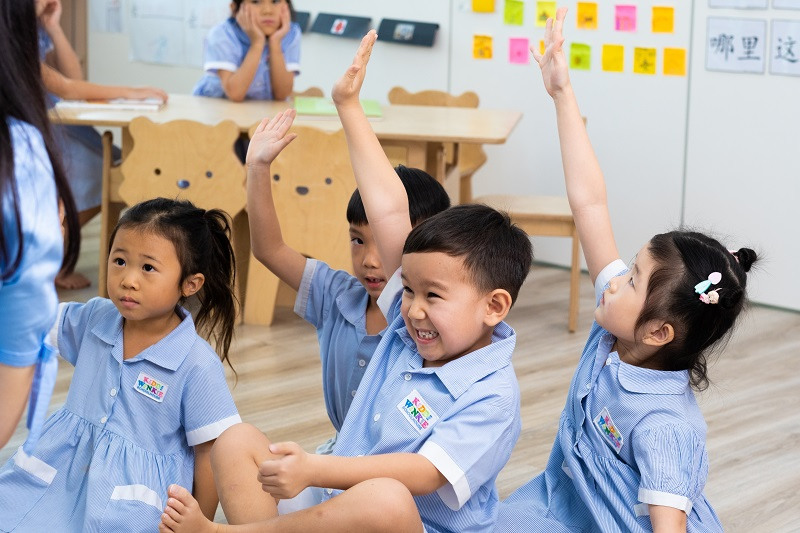
When it is time to think about preschool for your little one, it is both an exciting and overwhelming task because the hunt for the perfect preschool can be challenging.
As parents, we only want the best for our children, and it is no different when it comes to selecting a preschool for them. There is a huge variety of preschools in Singapore for you to choose from.
Many parents would have heard from friends and family members as they extol the virtues of their children’s preschools. Listening to their experiences can give you a mental checklist of what you want for your child in a preschool in Singapore.
Why is choosing a good preschool important for your children?
Studies have shown that when children are enrolled in early childhood programmes, they gain exponentially in their cognitive development, social skills, and psychomotor skills that are necessary for their daily lives.
A good preschool also helps to fill the gap when a child is not home with their caregivers in their natural environment. Thus, the challenge to find a preschool in Singapore that meets all your requirements can be a daunting task.
To help you reduce the stress and anxiety that you might face, here is a checklist that will come in handy as you shop around for the best preschool in Singapore for your children.
How can I start searching for potential preschools for my child?
Parents usually come up with a list of preschool options through word-of-mouth, recommendations from friends and fellow parents, centres near the location of their home or workplace, or online research which surfaces results from the news, bloggers, and search portals. Another helpful search portal is the LifeSG search portal created by the ECDA. As a mobile application and the one-stop portal for Government services, it is easier for you to locate available preschools near your homes, workplaces or caregivers’ homes.
An additional ECDA preschool guide for parents is a helpful reference for childcare subsidy and operational or administrative concerns, covering areas such as safety, health, hygiene, illnesses, and deposit refunds. It also provides details on relevant agencies and authorities you can contact for advice or assistance regarding childcare-related issues.
Choosing a Good Preschool for your Child – Factors to Consider
1. Class size – teacher/child ratio
The Early Childhood Development Agency (ECDA) has clearly designated the ideal teacher to children ratio on their website.
For a playgroup setting (18 months to 30 months old), the ideal ratio should be 2 teachers to 12 children. For the older children, the ratio would be 2 teachers to 30 children.
Research has shown that a smaller class size offers a lot of benefits to a child’s learning process. Teachers can cater to the needs of each individual child and spend more one-on-one time with them. This allows for them to pick out any learning challenges and tailor their approach to individual students. A smaller class size also provides comfort for little children who may struggle in a big group setting.
2. Centre Environment & Facilities
We are often charmed by the beautiful decorations and learning charts that the teachers have displayed on the walls. This also sends a signal to the parents that they take pride in their students’ learning and are proud to display their work for all to see.
However, take the time to look beyond the displays and observe the centre’s overall organisation. An overly neat classroom could signal that the children are not allowed to make a mess, whereas a constantly messy classroom would not be ideal either.
Here are some questions to help provide a better idea of what the ideal centre environment should be for your child:
• How important is the size of the classrooms to you?
• Are outdoor spaces and recreational facilities a priority?
• Are you inclined towards a spacious facility with a football field, or do you lean towards a more intimate, cosy environment?
• Do you value specialised areas like arts and crafts spaces, music rooms and Science and Arithmetic labs for hands-on learning?
• Are extracurricular activities, such as theatre and music, significant considerations for your child's development?
• What balance between indoor and outdoor activities would you prefer for your child?
• How does the school environment align with your child's interests, learning style and pace?
As you enter the preschool, you should feel a sense of warmth from the overall environment. The teachers and students should interact with comfortable familiarity. This is how your children will feel when they enter the school as well.
While discussing your queries with the principal and teachers, they should be able to answer most of your questions confidently as this indicates that the staff is knowledgeable in their field of work.
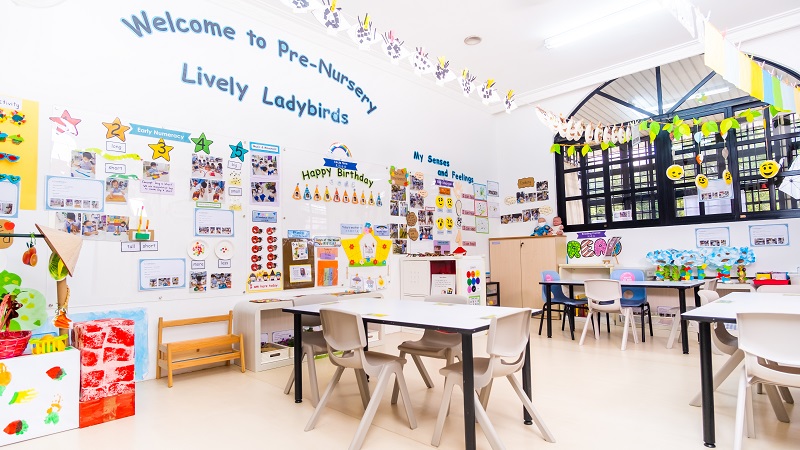
3. Space Constraints
Another consideration would be space constraints.
Is there enough space for your active children to move around while they are in school?
Is the space clearly defined for the different activities that the school conducts, such as nap time, mealtime, lessons, play etc.?
If there is an outdoor area, is it sufficient for a good number of children to run about safely?
These considerations should be within reason, bearing in mind that Singapore has limited land size as well.
4. Meal Plans and Daily Schedules
Beyond the organisation of the school, you should also consider the meals and snacks that the school provides for your children. Proper nutrition can enhance brain function, memory, and concentration in young children.
Every preschool in Singapore should strive to provide well-balanced, nutritious and healthy meals for the students, with a menu that is aligned with the Healthy Meals in Pre-school Programme (HMPP) under Singapore's Health Promotion Board.
When it comes to the arrangement of your children’s meals, find out if the food is prepared in-house or being catered by a reputable caterer.
If your children have several food allergies, is the school ready to support your children’s dietary needs? If they are unable to cater to your children’s dietary needs, are they flexible enough to allow you to pack homemade meals for your children?
If you have a fussy eater, you may want to find out what the school’s stand is on finishing the food on their plate, and if this aligns with your personal preferences.
5. Cleanliness, Hygiene & Safety
The overall cleanliness of the school is another important factor as children are very susceptible to falling ill from viruses.
Considering the current pandemic that we are in, preschools in Singapore should have a higher standard of cleanliness in order to protect our children from falling ill often. This would fall under their health and safety protocols. It is essential to ensure that the preschool maintains strict hygiene rules and cleanliness standards.
Some questions to ask include:
- Are the toys cleaned daily?
- Are the children encouraged to develop good personal hygiene like washing their hands before eating and after an activity?
- Are hand sanitizers readily available for the children to use when they need to?
Regular communication between parents and caregivers regarding your child's health and well-being is also essential. By ascertaining the health and safety measures in place, you can be confident your child is in a secure and caring environment of a good preschool.
6. Discipline
Classroom rules should be clear such that your children know their boundaries in a preschool setting.
Ask the school how they support their teachers to encourage positive behaviour in the class. It is important to know the school’s stand on their behavioural guidance towards your children in the event that conflicts or problems arise in the classroom.
As your child approaches preschool age, it's likely you have established preferred disciplinary methods. Ensure that the preschool you select aligns with your values and disciplinary approach, ensuring consistency between home and school. This reinforcement aids your child in understanding behavioural expectations quickly and confidently.
As parents, we have to work with the teachers to guide our children’s behaviours. They are still very young and some of their behaviours are simply a phase that they go through.
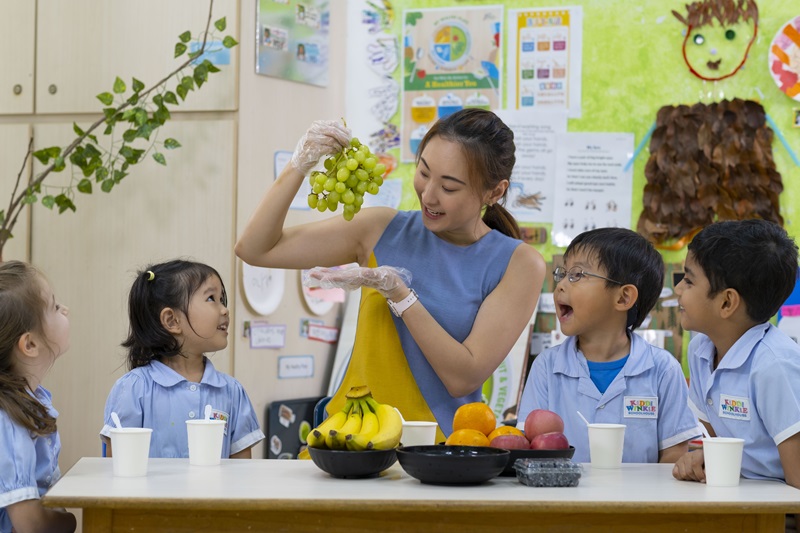
7. Communication & Relationship: Effective parent-teacher teamwork for your child’s growth
This aspect is often overlooked by parents during the preschool selection process, only realising its significance after the semester commences. The key takeaway is that your child's preschool should effectively communicate your child's development to you.
During the preschool visit, inquire about any specific learning and developmental goals set for your child, and understand the programmes that are offered to develop skills in these areas. The school should consistently monitor and report your child's progress, promptly addressing any areas of concern.
Additionally, clarify how this information and other school updates will be communicated to you and the frequency of such communications to ensure confidence in your child's safety and development at the preschool.
8. Reviews & Recommendations: Word-of-Mouth
Before making your final decision, connect with parents whose children attend your preferred preschool. Inquire about their overall experiences with the school, their observations on their children's development, and their interactions with teachers. Also do an online search for reviews and testimonials about the preschool centre. There's no better way to understand the true nature of a preschool than through direct insights from parents.
If you went for a school tour with your child, consider asking him/her the following questions:
• What about this preschool do you enjoy or feel excited about?
• Are there any aspects you disliked?
• How would you feel about attending school here?
If you can’t make a trip down personally, try to look for a virtual school tour, or contact the centre to ask for a good time to connect and chat. Other questions to consider asking the preschool are:
• Could you describe a typical day for the children here?
• Can you provide insights into the learning spaces designed for children of various ages?
• Is outdoor play integrated into the curriculum, and if so, how is it organized?
• Are the learning materials primarily created by the preschool headquarters, commercially sourced, or are they created by the preschool staff?
• How do you ensure that class materials are tailored to each child's unique learning needs?
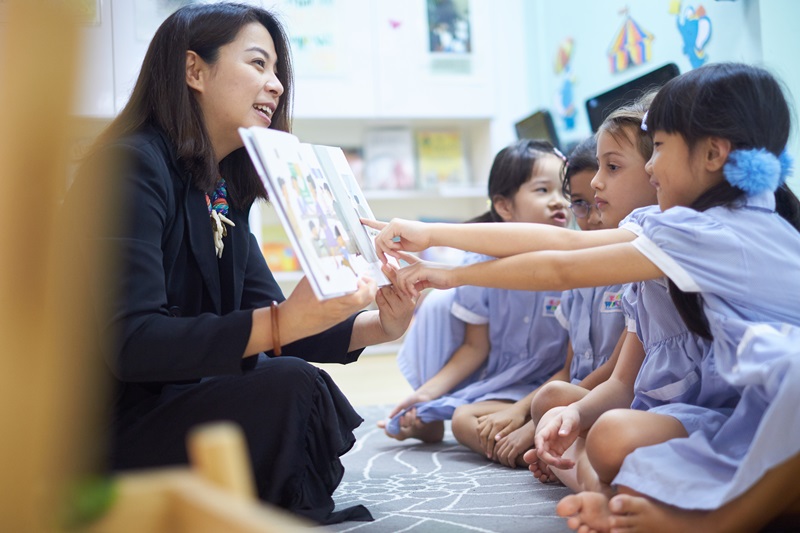
9. Staff Turnover Rate
The best preschools in Singapore will always strive to keep their staff happy and motivated. The staff turnover rate for the preschool is a telling factor to whether they are satisfied with their work environment.
Observe the teachers’ interaction with the students when you do your tour. Are the teachers actively involved in their lessons or do they look disinterested? Lookout for non-verbal cues and behaviour too.
10. School History, ECDA Awards & Qualifications
Lastly, ensure that the preschool has a reputable school history and holds relevant qualifications and awards. An accredited preschool can provide a high standard of care within a positive environment. Leveraging its extensive history, it can also deliver a comprehensive civics and moral education to instil the right values for your child.
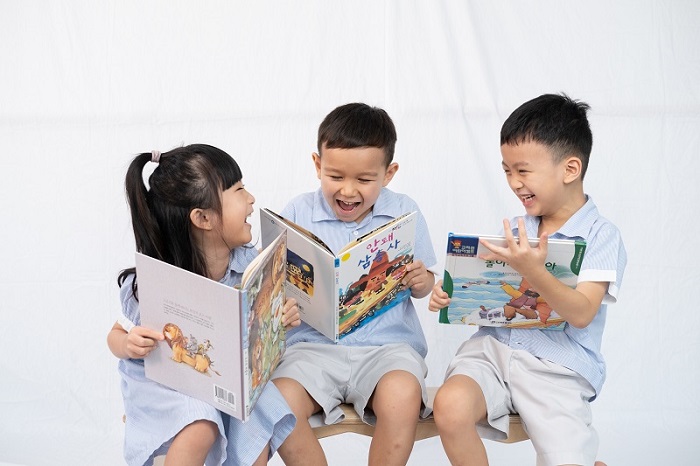
What happens after our discussion in choosing the best preschool in Singapore?
Now that you have a better idea of what to look for in a preschool, it’s time to book a tour with a preschool of your choice and see the learning and environment for yourself!
At KiddiWinkie Schoolhouse, we offer preschool programmes for children from 18 months to 6 years old, with a focus on inquiry-based learning to facilitate a child’s natural inquisitive mind. Half-day and full-day programmes are also available to cater to your family’s needs – along with infant care services at selected centres for little ones from 2 to 17 months.
Our campuses are also set up beautifully with purposeful areas to provide an all-rounded experience for your children – some of which come with an outdoor play area for play and learning to take place during the day.
Come and book your visit with us now!
Follow us on social media to stay updated on our latest updates and happenings:





